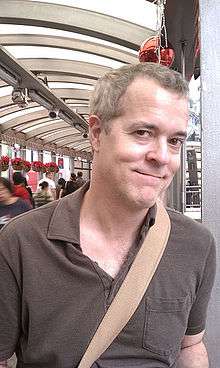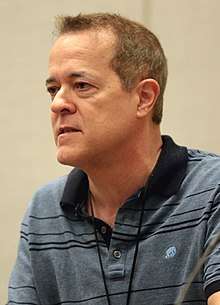Robert Reid (author)
Robert H. "Rob" Reid (born October 2, 1966) is an American author and entrepreneur. He is the author of two cyberthriller novels, Year Zero: A Novel, and After On: A Novel of Silicon Valley, as well as a non-fiction book, Architects of the Web, about the rise of the internet business. Reid is the founder of Listen.com Inc., which created the Rhapsody digital music service.[1][2]
Rob Reid | |
|---|---|
 Rob Reid | |
| Born | Robert H. Reid October 2, 1966 New York City |
| Alma mater | Stanford University, Harvard Business School |
| Known for | Entrepreneur, author |
| Spouse(s) | Morgan Webb |
| Website | www |
Early life
Robert Reid was born in New York City, and grew up in Darien, Connecticut. As an undergraduate at Stanford University he studied Arabic and International Relations. He also has an MBA from Harvard. In 1994, Reid moved to Silicon Valley to work for Silicon Graphics, where he managed the company's relations with Netscape.[1]
Career
Writing

After Silicon Graphics, Reid became a venture capitalist. He continued to write as well, for places such as Wired, including a 1997 cover story about online video.[3]
Reid is the author of four books, Architects of the Web, a book about the Silicon Valley, Year zero, a work of fiction, Year One, a book about Harvard Business School, and "After On: A Novel of Silicon Valley". He wrote his first book, Year One, which was an examination of student life, as a student at Harvard. The paperback was released by Avon the following year, in the wake of positive reviews from Business Week and others.[4]
His second book, Architects of the Web, was written 1997, and chronicled the rise of the Internet as a commercial medium as well as then rising entrepreneurs like Marc Andreessen of Netscape, Jerry Yang of Yahoo and Rob Glaser of RealNetworks. It was positively reviewed and later released in paperback in 1999.[5]
In July 2012, Random House/Del Rey published Reid’s third book, Year Zero, a work of science fiction.[6] The plot revolves around alien cultures coming into contact with Earth music. The resulting fines and penalties from copyright infringement have bankrupted the whole universe. Humans suddenly own everything—and the aliens are not amused.
In August 2017, Random House/Del Rey published Reid’s fourth book, 'After On: A Novel of Silicon Valley, a cyberthriller also rooted in science fiction.[7] The plot involves the rise of a superintelligent AI and involves elements concerning data privacy and government intrusion, post-Tinder romance, nihilistic terrorism, artificial consciousness, and synthetic biology.
Business and lecturing
Reid was the sole founder of the online music company Listen.com, where he served as CEO and as Executive chairman.[8] In 2001, Listen.com launched Rhapsody, an unlimited music streaming service for $9.99 a month—the first licensed service of its kind.[9] In 2003, the company was acquired by RealNetworks, where Reid remained as a company vice president.[10] Later, MTV purchased Rhapsody from RealNetworks for $230 million.[11]
In March 1999, Reid became the founding outside board member of IGN Entertainment.[12] IGN went public in March of the following year and was acquired by News Corp in September 2005 for $650MM.[13][14]
In March 2012, Reid gave a TED talk called "The $8 Billion iPod." He explained his idea of "copyright math." The talk satirized the information provided by entertainment lobbyists and lawyers to indicate losses accrued by the entertainment industry due to "copyright theft."[15]
Personal life
Reid is married to G4 personality and technology journalist Morgan Webb. The two collaborated on the online show Webbalert – a daily video podcast covering developments in the tech world. WebbAlert ran until 2009.[16][17]
References
- Kirkpatrick, David (July 7, 1997). "The Saga Of How The Web Was Won A Bunch Of Outlaw Entrepreneurs Got A Head Start In The Rush To Conquer The Internet. Then Bill Gates Rode Into Town". Fortune.
- Evangelista, Benny (October 4, 1999). "Listen.com Serves Up Music on The Net". San Francisco Chronicle.
- Reid, Robert (October 1, 1997). "Real Revolution". Wired.
- Reid, Robert (1995). Year One: An Intimate Look Inside Harvard Business School. Avon.
- Reid, Robert (1999). Architects of the Web: 1,000 Days that Built the Future of Business. Wiley.
- Reid, Robert (2012). Year Zero: A Novel. Del Ray.
- Reid, Robert (2017). After On: A Novel of Silicon Valley. Del Ray.
- "Bloomberg profile". Bloomberg Businessweek.
- "Listen.com Launches Rhapsody Digital Music Subscription Service". Streaming Media.
- "RealNetworks to Acquire Listen.com". EContent.
- "Viacom and Real Networks Join Forces: The Official Rhapsody America Terms". Seeking Alpha.
- "Executive Profile". Businessweek.
- "IGN Entertainment Inc (Snow) IPO". Nasdaq.
- "News Corp. Acquires IGN for $650 Million". Businessweek.
- "Rob Reid: The $8 Billion iPod". TED.com.
- Gannes, Liz. "Morgan Webb Does Her Own Web Show". Gigaom.
- "CrunchBase profile". CrunchBase.